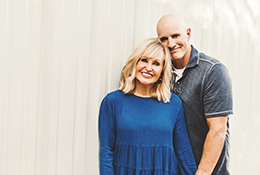
Making the Mundane Matter in Marriage
Gary Thomas, Paul David Tripp, Jonathan Pitts, Dave and Ann Wilson, and Bob Lepine talk about how to face mundane irritants in marriage with transcendent grace.
Show Notes
About the Host
About the Guest
-
Gary Thomas, Paul David Tripp, Jonathan Pitts, Dave and Ann Wilson, and Bob Lepine talk about how to face mundane irritants in marriage with transcendent grace.
-
Michelle Hill
Radio has been ingrained in Michelle for most of her life. This love for radio has taken her to various radio stations and ministries in places like Chicago, Alaska and other snow covered terrains like her hometown in north central Iowa. In 2005 she landed on staff with Cru/FamilyLife®. While at FamilyLife she has overseen the expansion of FamilyLife Today® internationally, assisted with the creation of Passport2Identity™-Womanhood and is now the host of FamilyLife This Week®. For the last 15+ years Michelle has been mentoring young women and is passionate about helping them find their identity in God. She also has a fascination for snowflakes and the color yellow. Michelle makes her home in Little Rock, Arkansas.
-

Bob Lepine
Bob Lepine is the Lead Pastor at Redeemer Community Church in Little Rock, Arkansas which he helped plant in 2008. He also serves on the Board of Directors for the Great Commission Collective, a church planting ministry connecting more than 150 churches world wide. Bob also hosts Mornings on Family Radio, a network of more than 70 radio stations in the US. He is also well known to radio and podcast listeners as the long-time co-host of FamilyLife Today® and as the on-air announcer for Truth...more
Dave and Ann Wilson
Dave and Ann Wilson are hosts of FamilyLife Today®, FamilyLife’s nationally-syndicated radio program. Dave and Ann have been married for more than 38 years and have spent the last 33 teaching and mentoring couples and parents across the country. They have been featured speakers at FamilyLife’s Weekend to Remember® marriage getaway since 1993 and have also hosted their own marriage conferences across the country. Cofounders of Kensington Church—a national, multicampus churc...more
Gary Thomas
Gary Thomas is a writer in residence at Second Baptist Church in Houston, Texas, and an adjunct faculty member teaching on spiritual formation at Western Seminary in Portland, Oregon and Houston Theological Seminary in Houston, Texas. He is the author of 20 books, including When to Walk Away, Sacred Marriage, Sacred Pathways, Cherish, Sacred Parenting, and the Gold Medallion Award-winning Authentic Faith. He has a master’s degree from Regent College, where he studied u...more
Jonathan Pitts
Wynter and Jonathan Pitts are the authors of She is Yours born of their journey in raising daughters. Wynter is the author of several books, including You’re God’s Girl! She is the founder of For Girls Like You, a ministry that equips girls to walk boldly into who God has created them to be and to resource their parents to raise strong Christ following God girls that say yes to His plans for their lives. Jonathan is a speaker and Executive Pastor at Church of the C...more
Paul David Tripp
Paul David Tripp is a pastor, author and conference speaker. He is the president of Paul Tripp Ministries and works to connect the transforming power of Jesus Christ to everyday life. This vision has led Paul to write 17 books on Christian living, produce 14 teaching series and travel aroun...more
You promised for better or worse, but when you got married, did you imagine you’d have major conflict over things like ice cube trays or damp towels on the floor? Gary Thomas, Paul David Tripp, Jonathan Pitts, Dave and Ann Wilson, and Bob Lepine talk abou
Making the Mundane Matter in Marriage
Michelle: When you got married, did you have expectations of a fairytale life? You know, after all, Cinderella and Prince Charming were your examples; but then, the honeymoon ended.
Paul: You walk into the bathroom; there’s a wet towel on the bathroom floor. It probably shouldn’t be there; and you say: “I can’t believe it! He would drop a wet towel on the floor! If he loved me, he would just never drop a wet towel on the floor! My dad was a dropper.” [Laughter]
Michelle: That’s Paul Tripp, and we’re going to talk today about towel droppers, ice cube tray non-fillers, and whether the toilet paper should be over the top or around the back. How does that work?—I don’t know. We’re going to talk about how the mundane things can actually stress out a marriage on this edition of FamilyLife This Week.
Welcome to FamilyLife This Week. I’m Michelle Hill. Are you a towel dropper? Or are you married to a towel dropper? Needless to say, if you’re married, you probably have some conflict. Maybe it’s over towels on the floor when you least expect it. It doesn’t matter how the fight started—or how the argument or how the conflict started—what really matters is what we do with it. Here’s Paul David Tripp again.
[Recorded Message]
Paul: If you make that big of a deal out of a wet towel on the floor, your problem is not just that you have a sloppy husband; your problem is you’re full of yourself!
Or you’ll say: “Why do you drive so jerky? [Laughter] Everywhere we go, it’s so jerky. Look at everybody else—they go [imitating a motor]: ‘Mmmmmm’—we never go, ‘Mmmmmm’; we just [bouncing sound]. [Laughter] I have to take Dramamine® just to ride with you!”
Or you have to be the grammar police: [Laughter] “That’s not the way that word is used!” Or you have to be the history police: you know, the other person can never tell a complete story without you jumping in.
I had a wife say to me, “I can barely go out to eat with my husband, because he chews like this [chomping sound].” She said, “He’s got a short upper lip and his teeth show.” I’m thinking, “He didn’t go to the lip store and say, ‘Give me the short ones!’?” [Laughter] “I can’t deal with the way he holds his fork,”—seriously?!
Or you’ve heard of the illustration of the toilet paper. I gave that particular illustration on a Friday night. At the end of the time together, a couple came to me and said: “We had such a rip-roaring battle over the flap of the toilet paper, that we called Charmin,® [Laughter] asked for a customer representative.” If you’re, right now, wanting to know what he said, you’re missing the point of this illustration! [Laughter]
Listen, I’ve told this in a funny way; but what I’ve described to you is the sad, dark, mournful music of marriage gone bad. The joy is gone; the unity’s gone; the love is dented and broken. You’ll never, ever get beyond that unless you humbly say: “We do that to us,”—because there’s something inside of us that says—“I have to have my way.”
[Studio]
Michelle: Oh, truth that hurts! That’s Paul David Tripp, talking about just how those little fights escalate; and it’s around that mundane stuff. Today, we’re going to take a look at, well, those vows you make at the wedding ceremony: “…for better or worse.”
Maybe it should say, “..for better, or mundane, or boring times in life.” It’s tense to be in those boring times of life—you know what I’m talking about—you wake up; you have your breakfast; get ready; you give your spouse a peck. You go to work; you come home; you eat dinner; you go to bed. And you do it all over, and over, and over, and over again.
It’s in those times that the little things—like the filling up of the ice cube trays or the towel dropping—that become an irritant. Just ask Gary Thomas, who’s a speaker, author, and friend of FamilyLife®. Gary has sort of a towel-dropping story—has to do with an ice cube tray—but he also shares how those little fights escalate. It’s always around those little things/those mundane things.
[Previous FamilyLife Today Broadcast]
Gary: There were no neon signs that said, “This is the direction you’re headed.” There were no signposts, saying, “Turn left to go this direction”; it was just: “This is what it’s like—serving the Lord, meeting a mortgage, raising kids—this is what happens.” I think the transcendent truth that you’re talking about will change our attitudes as we face that.
Another time in our marriage—we hadn’t been married that long—one of the issues that kept cropping up with Lisa and me had to do with ice cube trays. Now, the family I grew up in: if you got out an ice cube, you filled up the tray; and you put it back in the freezer so the next person would have a nice, full tray of ice cubes. I’m convinced that’s the biblical way to handle yourself in the kitchen. [Laughter] Unfortunately, my wife grew up in a family that would run that thing down to an ice chip. As long as there was anything you could scrape off with a knife, you weren’t morally obligated to refill the tray and put it back there.
Even though I’m from Seattle, I’m not a big coffee fan; but I’m serious about my Pepsi®, and I like it cold. I pull out this tray, and one little ice chip would pop out. I’d get so frustrated about these ice cube trays. I would share it with Lisa, and she would try to change; but you know, life-long habits can be impossible to break.
One night, she was speaking romantically to me; she said, “Gary, I’m going to love you forever!” I remember telling her: “Lisa, I don’t need you to love me forever. I need you to love me for seven seconds.” She said, “What are you talking about?!” I said, “Well, I timed how long it takes to fill the ice cube trays and to put them in the freezer.”
Bob: Ooohhh! You are Mr. Romance; aren’t you!?
Dennis: Yes, really!
Bob: That moment of passion was gone; wasn’t it? [Laughter]
Dennis: Yes!
Gary: Well, here’s the thing—and this is a dangerous thing for husbands to do—I was praying the next morning. The question came to me/it dawned on me: “If it only takes her seven seconds to fill the ice cube trays, how long does it take me?”—well, seven seconds.
The question I had to grapple with was this: “Is it possible I could be so shallow, so spiritually immature, and so selfish that I would honestly resent the fact that: “Here’s this woman—who had committed her life to me/who would, ultimately, bear me three children—occasionally put me out for seven seconds, once or twice a week?”
I had to admit: “Yes; I am that shallow. I can be that selfish!” It really changed my view. Instead of looking at those little annoyances of marriage that can just begin to fester and cause all kinds of relational poison and toxins, I began to look at it: “You know what? This is one of the reasons God made marriage: to reveal to us our sin; to show us, ‘You know what? You might not be as mature as you thought you were. You were kind of hiding.’” You’re able to do that, sometimes, as a single—if I got into a difficult relationship, I could just have a different roommate or something—but there’s something about this, almost, enforced intimacy of marriage that forced me to look at my life in a way that I never had before.
[Studio]
Michelle: That’s Gary Thomas, talking about the festering of sin and, when those little annoyances sit, they start to fester and fester; and they can take over. I’ve witnessed how little annoyances can be the beginning of the end in a roommate situation or in a marriage. It’s not good!
We have to be on guard against those little things and the sin in ourselves, but what happens when it’s something kind of baked in?—you know, something that is in our background/how we were raised? That’s something that Jonathan Pitts is familiar with. He and his late wife, Wynter, came from very different backgrounds. Wait! Why don’t I let Jonathan share this? Here’s Jonathan Pitts, talking with Dave and Ann Wilson and Bob Lepine.
[Previous FamilyLife Today Broadcast]
Jonathan: She grew up with her dad, who was a drug addict. She grew up with her mom and her grandmom in a house. Her mom and her grandmom both gave their lives to the Lord in 1979, the year before she was born. She grew up in a Christian home—a very warm environment in the inner city of Baltimore—lots of craziness going on around her home—but in her home, it was warm.
But there was no father figure in there; so, one, I had to learn to bring my tone down. I grew up in a family—twin brothers; three sisters. Everybody’s fighting and jockeying for position; you know? We had two very different environments; so that was a struggle, early on—just figuring out how to communicate well.
Dave: Yes; so I love the honesty in your book. I mean, immediately, I am like, “This is a couple that’s going to let us in to their marriage!” —slamming doors/fights—the whole thing! [Laughter] And the story, early in your marriage, where she got lost.
Jonathan: Yes.
Dave: Tell that!
Jonathan: Well, Wynter—she wasn’t a girl, who was really good at following directions, or even knowing where she was—in fact, she hated South Jersey, which is a really rural part of New Jersey; because there are no streetlights, and there are circles, and all of this stuff.
She leaves because of a fight and gets out of the house. The reality was—she didn’t know where she was going—she has to call me for directions to get home. [Laughter] For me, leaving wasn’t an option. I think for Wynter, it was kind of: “Fight or flight” kind of a deal. As she grew up, her dad left—that was one of the struggles she had, early in our marriage—but it wasn’t for me. I watched my parents, who have now been married 45 years/something like that; so there’s going to be intensity there—there’s going to be all of that—but leaving was never an option.
Ann: How did you work that out, when one of you would kind of shut down? Wynter was more quiet.
Jonathan: Yes.
Ann: So she would get quiet. Did that frustrate you? How did you guys work that out?
Jonathan: Yes; I mean, early on, it would frustrate me. I would just keep trying to assert myself and force myself—not in like horrible ways but not in a way that was mature—like if I was coming with/even my intensity I talk with right now—I just had that about me—I had to learn to temper that. The more I did, the more she would receive anything that I had to offer. She also had to learn to kind of step up to the table,—
Ann: —open up.
Jonathan: —even when she didn’t want to; yes. We met in the middle.
Bob: The title of your book is Emptied. The big idea is that, for marriage to work, we have to go through this process/this ongoing process of emptying the us—not the us—the me—
Jonathan: Yes.
Bob: —empty the me out of the relationship so that we can love one another better. In a moment like this, where there’s conflict, and one’s walking out or the other is walking out, that’s where you have to pull back and go: “Where’s the selfishness in that? Where’s the me that is the problem?” and “How do I empty that?”
We’re talking to people, who have been in conflict in the last 24 hours, who have maybe not recognized the me in the middle of that. What do they do when they’re in those moments? How do you drain the me out so you can be emptied?
Jonathan: The book is really based on Philippians 2:7—you know, it’s—“Although Jesus was equal with God, He didn’t take His equality as something to be grasped, but became a servant, humbled Himself to the point of obedience and death on a cross.”
It’s kind of a take on the idea of Jesus—who had every right to stay up here [in heaven]—basically comes down to meet somebody, who didn’t deserve to be met—us. The idea is, to be Christ-like, is actually to get rid of anything that would be any reason or any excuse as to why we can’t come down to meet—in any relationship, really, but specifically in marriage—to meet our spouse.
Honestly, the goal is emptying ourselves. We found a couple things that we’d be full of that needed to be emptied. The first was sin—like just sin we brought into our marriage—ugly sin; just sin. We’re human; we all bring it in. History, which we all bring in; and expectations, which we all bring in.
So how do you begin to empty yourselves of those things in order to be filled up—and to be filled up with the Spirit?—love, joy, peace, patience, kindness, goodness, gentleness, faithfulness, and self-control, which God can’t do if you’re full of all this other stuff and all these reasons as to why you can’t.
Dave: Talk to the person—and it would probably be me—[Laughter]— who is going: “Okay; I want to empty. I really value what you’re saying. I do want to empty myself and get rid of the me and love her, and love anybody, the way they deserve; but I can’t. I just get stuck! How do I empty myself?”
Jonathan: Yes; well, first, it’s like we end the book by talking about this reality—that you can only do it, looking at Jesus—“…looking unto Jesus, the Author and Perfecter of your faith.” You, literally, have to look to Him as the solution. In terms of the world, we can all do marriage pretty “okay”; but to do what God’s asked us to do, and to become we, that’s not happening without Jesus!
[Studio]
Michelle: Wow! Those are some hard words from Jonathan Pitts—hard words to hear, and hard words to act on—you know, it’s not about us; we’re not the center. Is your marriage serving you, or is it serving God’s purposes for you and your spouse? That’s really what we need to be looking at: Jesus is the center. We need to empty ourselves of our expectations, and our history, and our sin; and we need to keep Him the center.
You know—if you’re in a tough spot in your marriage, and you’re still listening today—you might be questioning me/you might be saying: “Michelle! What about me? My husband doesn’t love me; he doesn’t want to be around me! Well, emptying myself of my expectations just doesn’t seem to be working anymore.” That’s a fair question.
We need to take a break; but when we come back, we’re going to take a stab at answering that question for you. We’re going to talk about those tough spots in marriage, what some may call the “Leah marriage.” Stay tuned.
[Radio Station Spot Break]
Michelle: Welcome back to FamilyLife This Week. I'm Michelle Hill. Today, we’ve been talking about marriages going the long haul—and how just the mundane way of life that just happens—and during those mundane times, it can easily be the little things/the little idiosyncrasies in your spouse that drive you insane!
I also want to address the fact that, sometimes, going the distance in a marriage can be a very lonely place for one spouse or the other. That lonely place is a place of suffering; and it’s so much more than just the towel—and the dropper of the towel—or the ice cube tray. We know this is true because you write letters to us. We receive letters from women and men, who are stuck in loveless marriages. Recently, we received a letter, and it broke Ann Wilson’s heart. Here’s the reading of that letter; she described herself being in a “Leah marriage.”
[Previous FamilyLife Today Broadcast]
Bob: Somebody writes and says:
I enjoy your program. I do have a question that I don’t hear anybody speaking about. What about the Leahs of the family?
Leah is the reference to the Old Testament wife—you know the story—Jacob loved Rachel. Rachel’s dad said, “Well, if you want to marry Rachel, you’ve got to marry Leah first.” So she becomes the unwanted wife, living with a husband who didn’t really want her in the first place.
Ann: Yes.
Bob: This woman says:
In a Leah home, a husband is not interested in her or the children. I was listening to your program”—and this was when you guys were talking about Vertical Marriage—“about putting your spouse first. My spouse has always made it clear that he never wanted me or our children and has no interest in our marriage.
As time has gone on, he has been nicer to his children and has stopped hating me for ruining his life; but he still doesn’t really speak to me. He rooms with me but has no real relationship and runs from any conversation that doesn’t pertain to TV or immediate needs.
I’m not the only one, but you all make everything sound easy. I would venture to bet that a great number of marriages are not built from love. Most marriages in the Bible weren’t built from love either. I don’t have a love language, because that would be a luxury that I’ve never been afforded. Just be advised: your perspective is a little short-sighted.
Ann: I want to cry, just because I cannot imagine the pain/the loneliness that that woman goes through. That’s really hard!
Bob: Yes.
Ann: I think there are a lot of people, who live there, honestly. I could see that—as we share, and we talk, and we tell our victory stories—it can feel very much like that—like, “I wish I could just have my husband interact with me.”
Bob: It’s one of those desperately lonely and hurtful places to be in a marriage. You stop and think about it: “Why do we get married?”—because there is some hope for another person, who will know us fully and love us, even when he or she knows us.
Ann: —and that is the hope.
I’m assuming there are a lot of marriages, where people have entered into a covenant, because, maybe, a woman got pregnant and they decided to get married; so maybe there wasn’t a real love there. We’ve been in other countries, where it is an arranged marriage—and they don’t even know each other well, let alone love one another—what does that look like? I think those are great questions.
I would want her to go deeper into the story; because first, I would want to know if there’s any abuse going on. If there’s some sort of physical abuse, or even mental—like torturing kind of thing—I would probably advise her to leave the home. I’m not advising her to divorce, but I’m advising her to get safe and to get help. I would also really encourage her to get with a group of women in a church/a local church, where they are preaching the gospel and God’s Word. I would want her to be surrounded by people, who are loving her, encouraging her, speaking life into her, telling her what she’s great at; because she’s probably not getting that at home. That can feel very bleak, so those would be the first things I would say.
And then, I would go into just talking about Jesus, and how much He loves her/ how much He sees her. That’s the thing!—when you look at Genesis 29, and you’re talking about Rachel and Leah—as I’ve read it over the years, I’m always struck with—it says, every single time: “God sees her,” “God saw her,” “God heard her.” He was always noticing what was going on in Leah’s life, and Rachel, and all of us.
I think, for this listener, I would say: “God sees you; He hears you. He has caught every tear, and He’s empathizing with your loneliness and your pain. He wants to come right beside you and enter into it with you if you’ll allow Him to.”
I’m telling you—for the woman who wrote this email—“You are loved by God! He has a plan for you! He sees you; He knows the marriage you’re in; He’s not surprised by it. He’s wanting you to seek Him first, and He will be there for you.”
[Studio]
Michelle: If you are Leah, and you’re living through that life, that’s a hard life! Ann’s words were hard, but they’re true. If you are in that “Leah marriage,” I hope that Ann and Bob’s words encouraged you. You are walking a hard journey—a journey not everyone has—but thank you for doing the hard thing.
You know, our friend Gary Thomas is famous for posing this question: “What if your marriage is more about making you holy than it is about making you happy?” I know those are hard, hard words to hear; but they are true. Here’s Gary again.
[Previous FamilyLife Today Broadcast]
Gary: I would be grossly overstating things if I said our biggest issue was ice cube trays: that was one principle. I don’t want anybody to think that we have had this ideal marriage, where we haven’t had substantive issues to deal with. I think that will come through, later this week, as we talk.
But one of the purposes—again, we talk later about the covenant of marriage—we don’t get in front of a church and promise before God, and promise before our friends and family, that we will feed ourselves three times a day for the rest of our lives. Why don’t we do that? Well, we know we’re going to do that: it’s easy to do that; we want to do that.
The reason we have marital commitments and covenants is because it presupposes that it’s difficult; that it’s not always easy. In fact, in every marriage, there are going to be times, when a couple is going to have to choose: “Will we stay married?” I’m not just talking about divorce; although, certainly, that is part of it. I’m talking about staying married in the sense of: “Will we continue to fall toward each other? Will we continue to move toward each other? Will we continue to act married?” Every marriage is going to face those times.
The value of this approach—looking at, maybe, God designing marriage to make us holy even more than happy—where it gives us, I think, some added mileage to our commitment—is that it gives us that overall purpose—
Bob: Right.
Gary: —knowing that: “Even if I have a spouse, who isn’t cooperating, God is using this difficult marriage to shape me in such a way that I can fulfill His purposes for me in my life,”—that God is using this difficult marriage to make me into the type of person He wants me to be and to prepare me for the work He has.
[Studio]
Michelle: What a nice reminder from Gary Thomas that God is continually working in our lives, and continually sanctifying us—even in a difficult marriage, or even in a difficult spot in your marriage—or even in your singleness. I know there are many times I look around and I’m like: “Ouch, God! What are You doing here?” But will you still walk through those hard times?—and will you still serve a good God?
You know, we live in a time when nothing seems to satisfy us. We read our Facebook® feed and we’re like, “How come my husband didn’t bring me the dozen roses?” Or we watch TV and he [husband] says, after a commercial, “Hey, how come you don’t make that type of meal for me?” You know, we live in a media-saturated life that tells us that somebody’s life is always better than ours.
Was it in the Psalms?—I think Psalm 90, where King David says, “Oh, satisfy us in the morning with Your lovingkindness, that we may sing for joy and be glad all our days.” Satisfy ourselves in God—that’s what He wants from us—just something to think about/something to ponder this weekend.
Hey, next week, we are going to hear from some college students about balancing college, family, and life. We’ll find out the good and, well, maybe, the not-so-good advice that they received from mom and dad. It will be an insightful conversation. I hope you can join us for that.
Thanks for listening! I want to thank the president of FamilyLife, David Robbins, along with our station partners around the country. And a big “Thank you!” to our engineer today, Keith Lynch. Thanks to our producers, Marques Holt and Bruce Goff and Meredith Empie. Justin Adams is our mastering engineer, and Megan Martin is our production coordinator.
Our program is a production of FamilyLife Today, and our mission is to effectively develop godly families who change the world one home at a time.
I'm Michelle Hill, inviting you to join us again next time for another edition of FamilyLife This Week.
We are so happy to provide these transcripts to you. However, there is a cost to produce them for our website. If you’ve benefited from the broadcast transcripts, would you consider donating today to help defray the costs?
Copyright © 2022 FamilyLife. All rights reserved.
1

